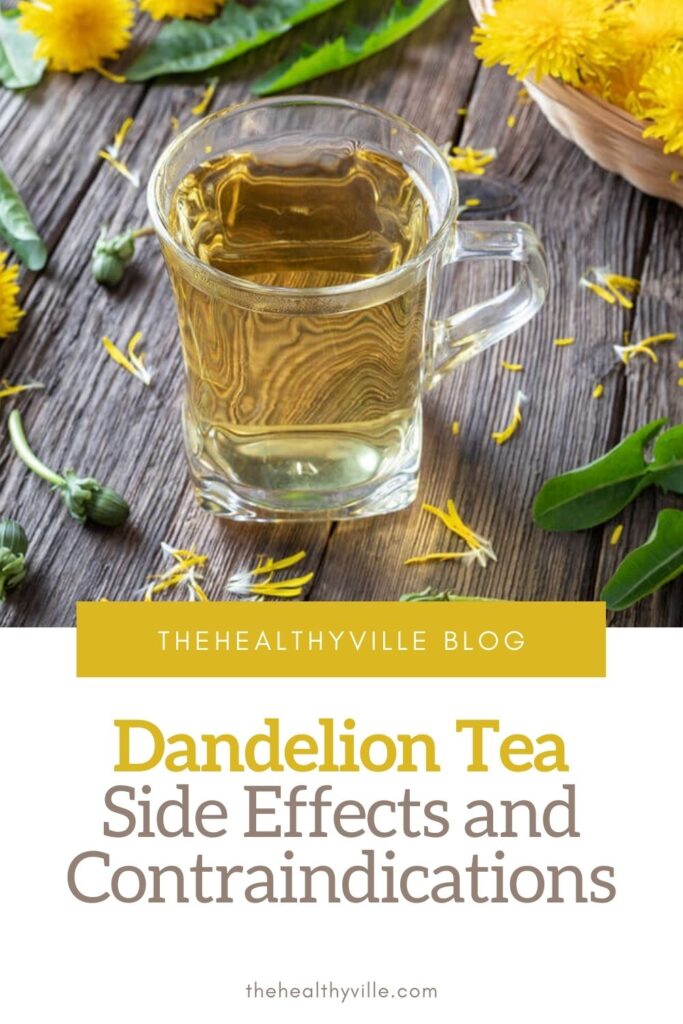Dandelion tea side effects are not that common, but you need to know about the contraindications in order to consume it safely!
In most healthy adults, moderate consumption of dandelion is considered safe. However, the plant is not without its contraindications and side effects.
For most healthy people, dandelion (Taraxacum officinale) is safe when taken in moderate amounts. However, like other plants that people use for medicinal purposes, it comes with contraindications in some cases and can cause side effects as well.
The general recommendation before consuming dandelion, whether in tablets, extracts or leaves, is to consult your doctor. This, especially if we are under some drug treatment or if we have any specific pathology. Let’s see in detail who should avoid its consumption.
What is the dandelion?
The dandelion, whose scientific name is Taraxacum officinale, is a plant that is used for gastronomic and medicinal purposes. It is part of the Asteraceae family and, according to information published in the American Journal of Botany, it is cultivated and produced predominantly in Bulgaria, Romania, Hungary and Poland.
Although to date there is no evidence to support its use as a first-line treatment against diseases, there is research with interesting findings on its pharmacological properties. In addition, according to data from the Precision Nutrition’s Encyclopedia of Food, a 55-gram serving of chopped dandelion leaves contains:
- 25 calories
- 1.5g protein
- 0.4 g fat
- 5.1 g of carbohydrates
- 1.9 g of fiber
- 0.4 g sugar
- Vitamin A, folic acid, vitamin K and vitamin C – in their raw form.
- Calcium and potassium
In general, the plant is consumed in infusion and salads. However, it is also available in extracts and supplements. The latter should be taken with caution, under the supervision of the doctor.
Contraindications
People value the dandelion for its nutritional properties. Research suggests that it has interesting pharmacological activity.
When used in the correct doses, both the root and the leaves of the dandelion are generally safe. However, it is important to know some cases in which there are contraindications. Information collected by the US corporation WebMD indicates that such cases include:
Pregnancy and breastfeeding: There are no studies that reveal information on the safe intake of dandelion in these stages. Therefore, avoid its consumption.
Eczema: Patients with this skin disease appear to be more likely to have an allergic reaction to dandelion. For this reason, if you suffer from this problem, it is essential to consult your doctor first before opting for its consumption.
Bleeding disorders: Patients with this type of disorder should avoid dandelion because it can increase the risk of bruising by slowing blood clotting.
Allergy to ragweed: having an allergy to ragweed and plants such as daisies or chrysanthemums alerts you to a possible risk of allergy to dandelions. Although there is contradictory information in this regard, it is better to abstain from its consumption and ask your healthcare professional.
Kidney failure: the reason is that it can increase the risk of kidney complications because it decreases the amount of oxalates that are released through the urine.
Medication consumption: Anyone who is under drug treatments should avoid dandelion due to the risk of interactions. According to the mentioned source, it can decrease the effectiveness of some antibiotics, such as ciprofloxacin and norfloxacin. Also, it can reduce how quickly the liver breaks down some drugs, increasing the risk of side effects.
Dandelion tea side effects
Dandelion side effects are rare in healthy adults who consume it in moderation. Often, these occur due to excessive consumption or because the person has an allergic reaction to the plant.
According to a publication in the National Library of Medicine, these effects include diarrhea and gastrointestinal upset, accompanied by heartburn, gas and pain. It can also cause allergies, with symptoms such as itching, irritated eyes, a dry mouth, or a lot of saliva.
How to avoid the side effects of dandelion?
To avoid the side effects of dandelion it is important to respect the recommended amount. You should not consume more than 3 cups of infusion per day, each prepared with 1 teaspoon (10 g) of the plant per cup of water. In the case of supplements, you must strictly follow the recommendations of the doctor or manufacturer.
To date there is not enough scientific information on the safe dose of dandelion. Due to this, its consumption should be moderate and occasional. In addition, it is important to be aware of its contraindications and to watch for side effects.
Don’t forget to SHARE everything you know about dandelion tea side effects with your friends and family on your social networks!

